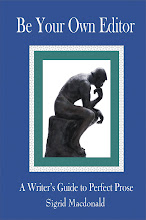Oftentimes as an editor, I see people confuse the word infamous with famous, but they mean entirely different things.
Fame brings celebrity. It means that someone is well-known, and the connotation is generally, although not always, positive. Natalie Portman is a famous actress.
Infamous means that someone is well-known for an unsavory, contentious or salacious reason. It's synonymous with notorious -- no one has solved the mystery of the murder of the infamous Biggie Smalls.
Some people are famous and infamous -- Madonna, Alec Baldwin, Eminem, Mel Gibson… There is a long list of people who are easily recognizable, but also push other people's buttons because they’ve said or done something controversial. So, it's possible to be both famous and infamous, or just famous, or just infamous. (The Arizona shooter and the Unabomber are simply infamous. Not many people admire them, and they gained fame by doing something heinous.)
Learn more about word usage in my third book, Be Your Own Editor, a manual for students and writers of all ages and stages. Available on Amazon in print and in the Amazon Kindle store [http://tinyurl.com/4v249th].
Monday, January 31, 2011
Sunday, January 16, 2011
Today's Writing Tip Is about Commas
Ah, commas. How can something so small and seemingly benign make a grown man cry? Seriously, commas can be confusing, but there are some rules of thumb that can be useful.
The Chicago Manual of Style recommends using a comma after every coordinating conjunction (words like and, but, or), but not everyone agrees. Standard Deviants’ Grammar Pitfalls suggests using a comma in a sentence that has more than two conjunctions. Here's an example --
Chicago version: I wonder if anyone is reading my writing tips, and I sometimes feel like swearing like a truck driver to test my theory, but I have faith in my readership.
Deviants' version: I wonder if anyone is reading my writing tips and I sometimes feel like swearing like a truck driver to test my theory, but I have faith in my readership.
Unless you're writing for a newspaper, you can choose the comma style that you like best. The only important thing to remember is consistency. Don't insert commas randomly; make sure that you have a system and stick with it.
Sigrid Macdonald is the author of Be Your Own Editor, available on Amazon.com in print and on Kindle (http://tinyurl.com/4v249th).
The Chicago Manual of Style recommends using a comma after every coordinating conjunction (words like and, but, or), but not everyone agrees. Standard Deviants’ Grammar Pitfalls suggests using a comma in a sentence that has more than two conjunctions. Here's an example --
Chicago version: I wonder if anyone is reading my writing tips, and I sometimes feel like swearing like a truck driver to test my theory, but I have faith in my readership.
Deviants' version: I wonder if anyone is reading my writing tips and I sometimes feel like swearing like a truck driver to test my theory, but I have faith in my readership.
Unless you're writing for a newspaper, you can choose the comma style that you like best. The only important thing to remember is consistency. Don't insert commas randomly; make sure that you have a system and stick with it.
Sigrid Macdonald is the author of Be Your Own Editor, available on Amazon.com in print and on Kindle (http://tinyurl.com/4v249th).
Monday, January 3, 2011
Today's Writing Tip Is about Using the Indefinite Article "A" Before Words Starting with "H"
Have a happy holiday. That's an easy sentence to conjugate. We all know that the article to use before the word happy is “a.” It would be unusual to see someone write, "have an happy holiday" and your spell-check is likely to pick that up.
What becomes complicated is when we talk about words like historical or Hispanic. Some people use “an” before historical – “It was an historical occasion” -- and other people don't. What's the deal? According to The Chicago Manual of Style, if your word begins with a silent “h,” you should use the article “an.” If the word begins with a hard ‘h,” use “a.”
Consequently, an historical occasion is only correct if you don't pronounce the “h” in historical. This seems easier to work out verbally because some of us say “herb” and others say “erb.” But to be on the safe side, have a system or use a style guide. I use the Chicago rule even though I know that some people will prefer “an historical holiday” to “a historical holiday.”
To learn how this differs for Americans and Brits, or for people of different age groups, read Tina Blue’s “article on articles” at http://grammartips.homestead.com/historical.html.
Sigrid Macdonald is the author of three books including Be Your Own Editor, available in print on Amazon or as an e-book on Smashwords.com.
What becomes complicated is when we talk about words like historical or Hispanic. Some people use “an” before historical – “It was an historical occasion” -- and other people don't. What's the deal? According to The Chicago Manual of Style, if your word begins with a silent “h,” you should use the article “an.” If the word begins with a hard ‘h,” use “a.”
Consequently, an historical occasion is only correct if you don't pronounce the “h” in historical. This seems easier to work out verbally because some of us say “herb” and others say “erb.” But to be on the safe side, have a system or use a style guide. I use the Chicago rule even though I know that some people will prefer “an historical holiday” to “a historical holiday.”
To learn how this differs for Americans and Brits, or for people of different age groups, read Tina Blue’s “article on articles” at http://grammartips.homestead.com/historical.html.
Sigrid Macdonald is the author of three books including Be Your Own Editor, available in print on Amazon or as an e-book on Smashwords.com.
Subscribe to:
Comments (Atom)


